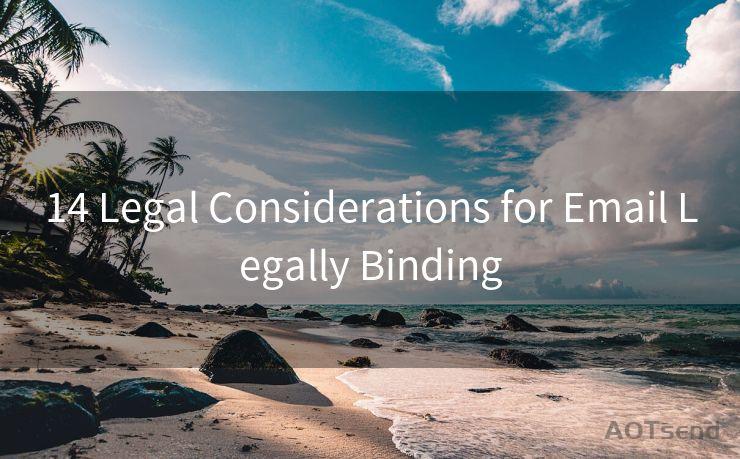14 Legal Considerations for Email Legally Binding




When it comes to business communications, email has become an indispensable tool. However, to ensure that your email communications hold legal weight, there are several key considerations to keep in mind. Here are 14 legal considerations that can help make your emails legally binding.
1. Clear Identification
Always ensure that your email clearly identifies the sender and the recipient. This helps to establish the authenticity of the communication and can be crucial in case of any legal disputes.
2. Intent and Offer Clarity
If you're making an offer or agreeing to terms via email, make sure your intent is unambiguous. Vague language can lead to misunderstandings and potential legal issues.
3. Contract Formation

Emails can form legally binding contracts. Ensure that all essential terms of the agreement are clearly stated and that both parties have agreed to them.
4. Electronic Signatures
In many countries, electronic signatures are legally recognized. Consider using an electronic signature service to add an extra layer of authenticity and legality to your emails.
5. Retention of Emails
Retain copies of all important emails. These can serve as crucial evidence in case of any legal disputes.
6. Privacy and Confidentiality
Respect the privacy and confidentiality of email communications. Avoid forwarding sensitive emails without permission, as this may violate privacy laws.
7. Copyright Issues
Be cautious when forwarding or attaching copyrighted material in your emails. Unauthorized distribution of copyrighted content can lead to legal troubles.
8. Defamation and Libel
Avoid making defamatory or libelous statements in your emails. Such statements can result in serious legal consequences.
9. Compliance with Laws and Regulations
Ensure that your email communications comply with all relevant laws and regulations, such as data protection and anti-spam laws.
10. Disclaimers and Disclosures
Consider including disclaimers or disclosures in your emails, especially if you're providing advice or information that could be misconstrued.
11. Consent and Opt-In
When sending marketing or promotional emails, ensure that you have the recipient's consent. Violating opt-in rules can lead to legal issues.
12. Archiving and Retrieval
Implement a system for archiving and retrieving emails. This is crucial for maintaining records and facilitating easy access in case of audits or legal proceedings.
13. Two-Factor Authentication
Enhance the security of your email account by enabling two-factor authentication. This adds an extra layer of protection against unauthorized access.
🔔🔔🔔
【AOTsend Email API】:AOTsend is a Managed Email Service for sending transactional emails. Support Email Types: reminders, authentication, confirmations, notifications, verification codes, invoices, password resets, account activations, billing statements, two-factor authentication (2FA), and one-time passwords (OTP) emails, etc. $0.28 per 1000 Emails. 99% Delivery, 98% Inbox Rate.
You might be interested in:
Why did we start the AOTsend project, Brand Story?
What is a Managed Email API, How it Works?
Best 25+ Email Marketing Platforms (Authority,Keywords&Traffic Comparison)
Best 24+ Email Marketing Service (Price, Pros&Cons Comparison)
Email APIs vs SMTP: How they Works, Any Difference?
14. Legal Review
For critical email communications, consider having a legal professional review your messages before sending. This can help identify and mitigate potential legal risks.
By following these 14 legal considerations, you can ensure that your email communications are not only effective but also legally binding. Remember, when it comes to email, it's always better to err on the side of caution.




Scan the QR code to access on your mobile device.
Copyright notice: This article is published by AotSend. Reproduction requires attribution.
Article Link:https://www.mailwot.com/p1387.html



